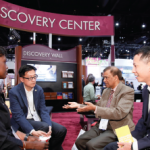After the initial phase, several things stood out. First, the college years can be a critical time, when lifelong health behaviors can be established, but it is also a time when young adults are less likely to listen to and receive health information through traditional channels. African-American students report low acceptance of messages that seem patronizing or overbearing, and studies show young adults tend to listen to “well-meaning friends” more than adults or other authority types and that college students consistently ranked peer educators and conversations with peers as the most favorable and memorable delivery mechanism for health information.5,6
“It was important to us to learn as much as possible about our intended audience and connect with them where they are looking for health information,” says Sheryl McCalla, senior director of collaborative initiatives.
Second, providing direction on how to use the information was just as important as providing accurate, thorough information.
With these factors in mind, the group identified college campuses as the locale to deliver the messages, peer-to-peer delivery was identified as the vehicle for the messages, and a step-by-step guide was identified as the method. COIN worked with ACR members and others to design a playbook that provides scientifically accurate lupus education and awareness information that can be delivered through peer-to-peer networks.
The graphic design for the playbook was taken from a national lupus awareness campaign implemented by the ACR and the Lupus Foundation of America (befiercetakecontrol.org).
The playbook’s content development was guided by the Centers for Disease Control & Prevention’s Clear Communication Index to enhance the playbook’s clarity and ease of use for the intended audience. The artwork, format and content were reviewed by people with lupus, rheumatologists and both a health literacy expert and a cultural competency expert.
Use So Far
This spring, organizations at Agnes Scott College, Florida A&M University, Michigan State University and South Carolina State University utilized the playbook on their campuses and participated in a comprehensive evaluation of it.
In general, students thought the playbook gave them an opportunity to hold meaningful conversations about lupus and to debunk some of the myths about the disease. One student mentioned the playbook helped increase knowledge about the seriousness of lupus and how it can affect a young woman’s life. “I didn’t know what lupus was leading up to the event, I’ve barely heard of it,” says a student leader. “Now I can explain it on a deeper level than the average human being.” The playbook is now available to everyone and can be downloaded here.
Other Audiences
Importantly, the playbook is flexible enough to be repurposed and used by other types of organizations, such as faith-based groups or sports leagues, and in other settings, such as for beauty and fashion events. The playbook is a sustainable resource that stands on its own and can be customized not only by audience, but also by disease. An organization looking to raise awareness about a disease other than lupus only needs to replace the lupus educational and promotional content with content related to another disease topic.


